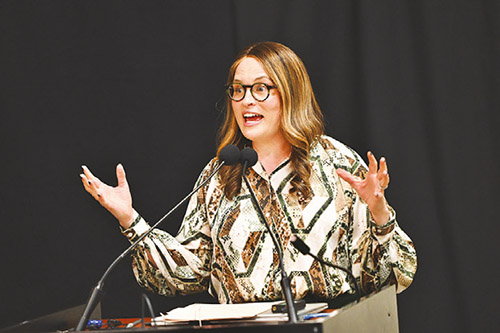Conference Scholars Explore Last Thousand Years of Jewish Leadership
Touro’s Lander College for Women Hosts Two-Day “Jewish Leadership in the Past Millennium" Conference

A few hundred people, online and in person, visited Touro’s Lander College for Women in Manhattan in November for a two-day Touro University conference, “Jewish Leadership in the Past Millennium.”
Almost two dozen scholars and thought leaders presented over the course of the two days, exploring dimensions and examples of rabbinic, intellectual, cultural, communal, educational, political and social leadership within Judaism over the last 1,000 years.
“This exciting two-day, five-session conference blended rich scholarly content with highly engaging presentations and lively speaker audience interaction,” said Dr. Michael Shmidman, dean of the Touro University Graduate School of Jewish Studies.
Leadership in the Face of Adversity
Subjects included Rabbi Judah the Pious, a 12th-century German mystic who was described as “possessing supernatural abilities”; Rabbi Samson Raphael Hirsch’s use of a popular concept in the Reform movement as a method of bolstering the beliefs of traditional Jews; and the story of a struggle within Cincinnati’s greater Jewish community in the 1930s when Orthodox leaders tried to build a mikvah and were met with fierce resistance by the local Reform congregation.
Touro Law Center (TLC) faculty delved into the leadership qualities of well known Jewish judges, including Supreme Court Justice Louis Brandeis and Supreme Court Justice Elena Kagan. French Jewish leadership and the Dreyfus Affair and Polish Jewish leadership in the aftermath of the Holocaust were also addressed.
“Building the Jewish community and preserving Jewish culture is central to Touro’s mission today,” said Touro President Dr. Alan Kadish in his introductory remarks. “Part and parcel of meeting these challenges in achieving our goals is to nurture and create the Jewish leaders of the future, and by holding this conference today, we hope to refine those lessons for everyone concerned.”
A common thread throughout several of the discussions was Jewish leaders over the centuries who utilized creative and ingenious methods for the sake of protecting their Jewish communities, and when possible, expanding the community’s influence beyond their limited Jewish world. Other sessions, such as the profiles of the prominent American judges, demonstrated how Judaism shaped the jurists’ mentality, which in turn played a significant role in their opinions and leadership qualities among the secular community.
Toward the end of the first day, Professor Stanley Boylan, Touro’s vice president of undergraduate education, gave a presentation, “Ish ufkudato,” highlighting the mission-based leadership of Touro founder Dr. Bernard Lander. “Some have argued that Dr. Lander’s background in sociology and his analysis of the class social structure led him to create Touro, as he believed religious Jews could face similar social alienation attending a secular college,” said Boylan. “However, the truth is that Dr. Lander’s vision and mission derived not from sociology, but from a deep-rooted religious conviction and a passion to assure the continuity of the Jewish community after the devastation of the Holocaust.”
Dr. Henry Abramson, academic dean of the Lander College of Arts & Sciences, chaired the final session. The conference, he summed up, “provided a retrospective view of the trends of Jewish leadership in the past century, articulated by many of the most significant Jewish scholarly leaders of the current century.”

